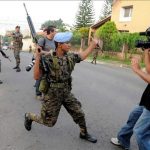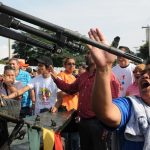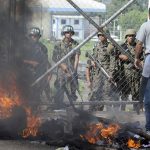On Sunday June 28th, President Manuel Zelaya of Honduras was awoken by the sound of soldiers kicking in the door of the presidential residence. He was abducted, still dressed in his pyjamas, and bundled into a waiting vehicle. The soldiers took him and put him on a flight to Costa Rica. With Zelaya out of the way, his opponents set about justifying their actions and attempting to establish control over the country.
Manuel Zelaya was a strange target for a rightist putsch. A wealthy banker and rancher, he was the preferred candidate of the Liberal Party which, along with the more conservative National Party, formed the political establishment in Honduras, a country which has been ruled by a mix of military dictatorships and right wing governments of the elite; what Venezuelan President Hugo Chavez would call the oligarchs. The ruling classes in Honduras was comfortable with his election. Throughout the 1980s, the country had been turned into an armed camp for Reagan’s war against the Sandinista government in Nicaragua. Decades of death squad operations and a stifling political environment had ensured that the left in Honduras was extremely weak. But conditions in Honduras are extremely hard for the poor. It is one of the poorest countries in the Americas; like many Central American countries, its main source of income is income repatriated from workers overseas. The life expectancy is only 66.2 years and literacy languishes at 76.2%. Approximately seventy percent of the population live beneath the poverty line.
After being elected, Zelaya began to shift away from traditional Honduran politics. He raised the ire of his own party by raising the minimum wage by sixty percent. He welcomed Cuban doctors into the country to work amongst the poor majority and applied to join, and was accepted into ALBA, the Bolivarian Alternative for the Americas. This put him beyond the pale for the oligarchy in Honduras, including in his own party. Zelaya became an obstacle to business as usual.
The final straw came when he proposed a non-binding referendum to gauge support for a process of constitutional reform. This has been consistently and dishonestly reported as an attempt to allow himself the possibility of reelection. In Honduras, a president is restricted to a single four year term. The constitution also contains a clause barring from political office any politician who advocates repeal of the one term limit. The referendum question actually read: “Do you agree that, during the general elections of November 2009 there should be a fourth ballot to decide whether to hold a Constituent National Assembly that will approve a new political constitution?” Teachers’ groups, unions, students and indigenous groups (ninety percent of Honduras’ population have some Indian ancestry) organised large rallies in support of the referendum.
In the initial stages of organising the poll, the military accepted and cooperated with the process. In Honduras it is traditionally the military which distributes the ballot papers during elections. However only days out from the poll, due to take place on Sunday 28th, the Supreme Court declared the referendum illegal and the army decided to withhold the voting forms. As the constitutionally appointed Commander in Chief of the armed forces, Zelaya ordered the military to comply and issue the papers. When the army chief refused, Zelaya sacked him . The Supreme Court declared the dismissal to be unconstitutional and, according to their own version of the events, ordered the army to arrest Zelaya.
Following the arrest and banishment of Zelaya, the new administration ordered a forty eight hour curfew and cut off internet access and electricity. Congress was presented with a document which was claimed to be a letter of resignation; Zelaya has denied signing any such letter. Also arrested was Honduras’ Foreign Minister and close Zelaya ally Patricia Rodas, seized while being physically defended by the Cuban and Venezuelan Ambassadors. She has subsequently been released and will attend the ALBA meeting in Managua.
The coup is far from secure. Soldiers are reportedly nervous and there have been many instances of their being punched and abused by women in the streets. Two battalions of the army (the 4th and 10th) are reported to have declared their support for Zelaya. No nation has come out in support of the coup administration. The US however has carefully avoided referring to the events as a coup, a step which would require them to withhold aid to the country, including aid to the main parties of the oligarchy. A general strike is spreading across the country and the social, indigenous and workers’ movements, while facing risk of arrest, are organising to resist the coup government. Ironically, if this coup is defeated, it is possible that Honduras will emerge from this coup with the forces of the left stronger than ever.




well said…..i was there, had dinner with zelaya sat. evening and you have stated the real situation.
the plebicite was NOT about extending zelayas presidency, it was about reforms that are far more important than term limits. i have spent a fair amount of time in honduras and have personally seen the aid zelaya has provided to the poor in honduras. again WELL SAID.
Thanks, it’s always nice to get positive feedback!
Cheers,
John
2pm this Saturday (the 4th July) Socialist Aotearoa is holding a vigil in solidarity with the people of Honduras. Meet outside the US Consulate on Customs Street.